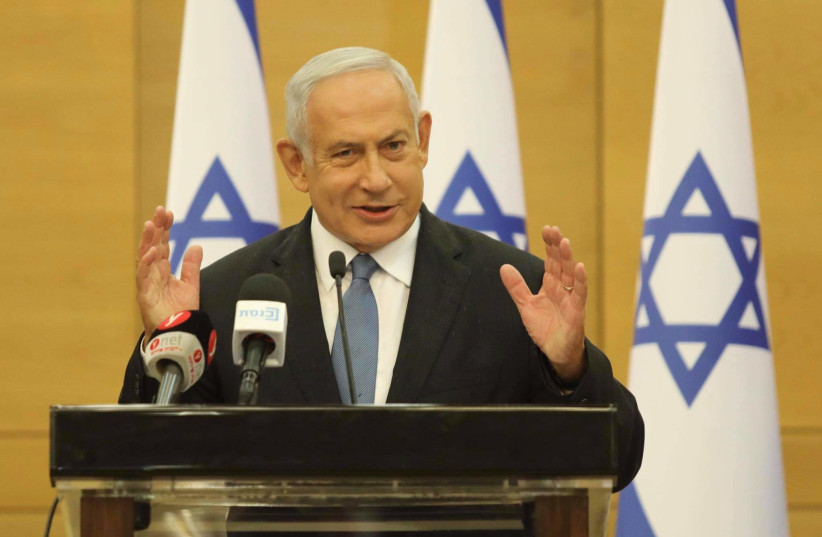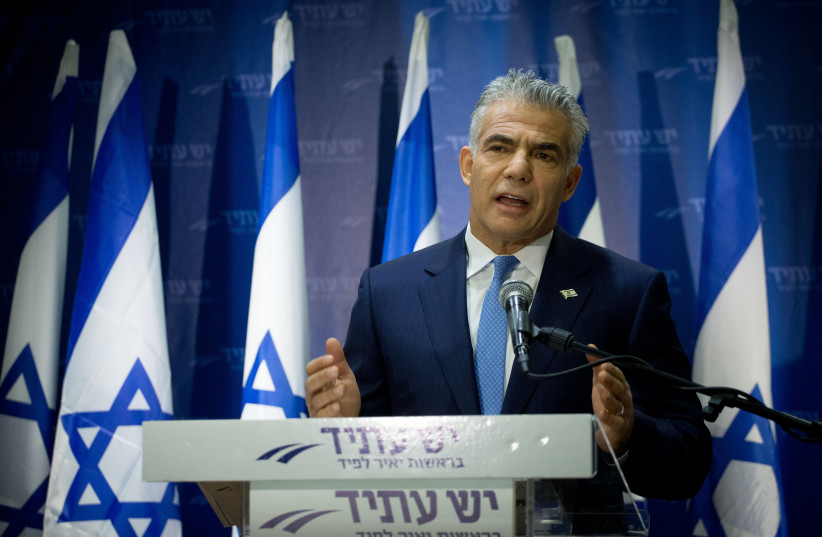In a bold move for a centrist-left politician running for office in a country dominated by right-wing politics, Prime Minister Yair Lapid affirmed his support for a two-state resolution to the Israeli-Palestinian conflict on Thursday afternoon.
Lapid did it publicly on the biggest international stage that exists, the United Nations General Assembly, so that the many world leaders gathered there could hear his words.
He is the first Israeli prime minister to speak of a vision of an Israeli and a Palestinian state living side-by-side in peace since Benjamin Netanyahu addressed the UNGA in 2016.
There was a time when politicians on the Israeli Left and Right could speak of this without generating media headlines, and they did, including former Likud prime ministers such as Ariel Sharon and Netanyahu. Now it’s only the Left that discusses it domestically.
Even centrist Defense Minister Benny Gantz, who heads the National Union Party, speaks of “two entities” rather than “two states.”

Netanyahu dropped two-state language from his lexicon when former US president Donald Trump was in the White House, save for the brief time Trump’s peace plan was under discussion.
His successor Naftali Bennett didn’t just brush aside the concept; he has been an active opponent of Palestinian statehood from the start of his political career.
Bennett immediately attacked Lapid for resurrecting the idea of two states at the UN, even before the speech was delivered.
“The year is 2022, not 1993,” Bennett said, referencing the Oslo Accords, which set Israel on a two-state path. “Even Israel’s true friends do not expect us to compromise on our security and our future.”
Complicating coalition efforts
Lapid’s UNGA speech will likely complicate his efforts to form a coalition after the elections, given he will need to pull in politicians who oppose Palestinian statehood and who in some cases view it as an existential threat.
The two-state affirmation will, however, gain Lapid accolades with the international community, which has already opened its arms to him. The statement will make him more effective both in his role as prime minister and as Israel’s chief advocate.
The more prime ministerial Lapid can appear during his brief tenure with photos of warm embraces with world leaders, the more likely it is that voters would vote to extend his tenure in that position.
Indeed, the gap has narrowed between him and his chief rival, Netanyahu, since Lapid took over the premiership. Polls have shown Netanyahu’s Likud has dropped to 32 seats, while Lapid’s Yesh Atid has risen to 24.
Politics and diplomacy, however, are not the only motivating factor here.
For Lapid, the issue is also existential and personal. Lapid falls into the camp of those who believe that a two-state solution is the only way to preserve Israel’s ethnic nationalistic identity as a Jewish and democratic state.
As the child of a Holocaust survivor, his belief that only a Jewish state can safeguard the Jewish people is written into his DNA.
Lapid has been known to say that his father did not survive the Holocaust to come to Israel just so there could be a binational state.
Despite the high-stakes nature of the situation, Lapid’s bold gesture stops at the UNGA podium. He himself is blunt about the limitations of the situation in which he finds himself.

As a caretaker prime minister, the best he can do at the UNGA is lay out a diplomatic vision for his country. His efforts, however, stop at the podium in the global plenum.
There are some pragmatic limitations here that are beyond him. He entered office only in July and could be out by November or December, hardly enough time to resolve a long-standing territorial conflict.
Lapid, therefore, cannot embark on any new initiative. He could have, however, been bolder and used the UNGA speech to unveil an Israeli peace plan, thereby turning the election into a referendum on that plan. But this is not on his agenda.
If anything, Lapid has hesitated to answer questions that detail his vision of two states, including refraining from setting out the borders of that vision. Although he, like many Israelis, has rejected any two-state plan based on the pre-1967 border.
But a concrete plan wasn’t his only option. Lapid could have taken a simpler route and stated his intention to meet with Palestinian Authority President Mahmoud Abbas as the first step in a potential peace process, a prelude to the kind of dialogue that could occur between the two men should he become prime minister.
Lapid and Abbas
Lapid has spoken briefly by phone with Abbas to offer a holiday greeting, but still has no intention of going beyond that with a face-to-face meeting.
It’s a choice that undermines the boldness of Lapid’s UNGA gesture, by delivering the message that Israel wants two states, but is not ready to push for it.
It’s not exactly convincing to say, “I want two states, but I don’t want to talk to the Palestinian leader.” One has to ask how one arrives at two states without such a conversation.
To delay even an initial conversation, one has to on some level believe the status quo is sustainable. Opponents of Palestinian statehood hold that the status quo plays to Israel’s benefit in that it helps prevent the creation of what they believe will be another failed Palestinian state. They see it like a ball that rolls down a hill gaining speed with each loop down. The further one gets from any peace process, the stronger the likelihood goes that the idea of Palestinian statehood would fade.
But if it fades, it does so for all those engaged in the conflict, on the Right and on the Left, for Israelis and Palestinians, strengthening all options.
Abbas has played off this idea of an abandoned peace process to campaign for unilateral statehood recognition among Western countries and the UN, which he hopes will recognize Palestine as the 194th member state. He is likely to call for unilateral statehood recognition when he addresses the UNGA on Friday morning.
It’s not the first speech in which he has done this, but time has played to his favor on this topic.
The last US-brokered peace process fell apart in 2014, and US President Joe Biden has not seemed interested in resurrecting it, even though he paid lip service to two states when he addressed the UNGA on Wednesday.
The European Union has opposed unilateral Palestinian statehood recognition, but Ireland is already breaking rank and considering such a move in the absence of a plan to resolve the conflict.
Eight years with no movement and no possibility of progress on the two-state track shifts the spotlight to other paradigms, including that of one state “from the River to the Sea.”
If there is no timeline for a two-state plan and no framework to achieve it, then one state becomes almost the only viable option, particularly since the Israeli military has been in control of the West Bank for 54 years, with no end in sight.
The situation provides fertile ground for opponents of Israel who want to erase Israel’s ethnic nationalist identity and argue that a situation in which Palestinians and Israelis do not share equal individual rights from the River to the Sea is akin to apartheid. It’s a campaign that has gained traction, particularly at the United Nations.
The danger is not just on the diplomatic front. The absence of any horizon of diplomatic hope has also helped fuel violence on the ground in the West Bank, as a more viable option to achieve Palestinian statehood.
The latest violent outbreaks
The latest upsurge in violence differs from the Second Intifada, which began in 2000, or the Knife Intifada of 2015, in that in both intifadas it appeared that the Palestinians could have chosen to negotiate.
Here there is no negotiation option. There is only a dangling promise that one day, at some distant time, there could be a two-state option. In that way, the wave of violence breaking across the West Bank today is more akin to the First Intifada, which broke out in 1987, in a period without a diplomatic process.
Lapid might sound dramatic and intense when he speaks of the dangers of one state or binational state option. But in practice, if he wants to avoid the danger of such a reality and promote two states, he will have to do more than just utter the words at the UNGA.
The morning after his speech, Israelis and Palestinians will wake up and violence will still rage as a result of the conflict.
At this point, with the West Bank in flames and the PA on the verge of collapse, and the apartheid campaign against Israel gaining steam, any talk of peace not followed by immediate action is a lot of “sound and fury, signifying nothing.”
